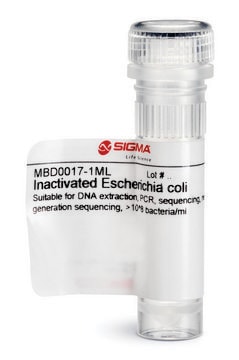MBD0012
Microbial DNA standard from Enterococcus faecalis
Suitable for PCR, sequencing and NGS, 10 ng/μL
About This Item
Javasolt termékek
Minőségi szint
form
liquid
koncentráció
10 ng/μL
technika/technikák
DNA extraction: suitable
DNA sequencing: suitable
PCR: suitable
kiszállítva
ambient
tárolási hőmérséklet
−20°C
Általános leírás
Read here how to use our standards to ensure data integrity for your microbiome research.
Alkalmazás
Suitable for Quantitative standard for PCR, Sequencing and NGS
Tulajdonságok és előnyök
- Individual microbial standard for microbiomics and meta-genomics workflow
- Suitable standard for PCR, sequencing and NGS
- Improve Bioinformatics analyses
- Increases reproducibility
- Compare results lab to lab
Fizikai forma
Tárolási osztály kódja
12 - Non Combustible Liquids
WGK
WGK 1
Lobbanási pont (F)
Not applicable
Lobbanási pont (C)
Not applicable
Analitikai tanúsítványok (COA)
Analitikai tanúsítványok (COA) keresése a termék sarzs-/tételszámának megadásával. A sarzs- és tételszámok a termék címkéjén találhatók, a „Lot” vagy „Batch” szavak után.
Már rendelkezik ezzel a termékkel?
Az Ön által nemrégiben megvásárolt termékekre vonatkozó dokumentumokat a Dokumentumtárban találja.
Cikkek
DNA standards enhance metagenomics research integrity, offering precise species study and mixed community standards.
A DNS-szabványok fokozzák a metagenomikai kutatások integritását, pontos fajvizsgálatot és vegyes közösségi szabványokat kínálva.
Tudóscsoportunk valamennyi kutatási területen rendelkezik tapasztalattal, beleértve az élettudományt, az anyagtudományt, a kémiai szintézist, a kromatográfiát, az analitikát és még sok más területet.
Lépjen kapcsolatba a szaktanácsadással






